Table of Contents
10 Best Returns Management Software For E-commerce
Overview
If you are struggling with a high return rate, you are likely looking for a returns management software that actually addresses customer churn. According to the National Retail Federation, online return rates hover around 20 percent, significantly higher than in-store retail.
Many first-time e-commerce customers treat returns as a one-time transaction; they get the refund and leave because they don’t see the value in staying.
A best-in-class returns management solution changes that outcome. Instead of defaulting to a refund-first approach, it turns returns into a continuation of the buying journey. A size S t-shirt can be exchanged for a size M, or a handbag swapped for sunglasses. The price differences, approvals, and refunds are handled automatically in the background.
Below, we break down the 10 best returns management software platforms for e-commerce brands that approach returns from two angles: cost efficiency and customer satisfaction. Each software is evaluated for practical feature impact, pricing, brand fit, and real customer reviews.
Key Highlights:
-
Returns have moved beyond customer experience, directly impacting margins, support load, and inventory planning as volumes and expectations increase.
-
Returns management software brings return initiation, approvals, carrier handling, tracking, and resolution into a single operational layer.
-
Automation reduces manual review, shortens return cycles, and lowers support dependency while improving visibility into return costs and performance.
-
Exchange-first and credit-based resolution flows help protect revenue while maintaining customer trust.
-
For high-volume and enterprise e-commerce brands, a structured RMS replaces fragmented tools with a scalable, data-driven returns workflow.
Retailers are constantly evolving and working to meet customer expectations, and they recognize the importance the returns process plays.”
NRF Vice President of Industry and Consumer Insights Katherine Cullen
What Is Returns Management Software?
Returns management software (RMS) helps e-commerce brands systematize how returns are approved, resolved, and logistics handled throughout the returns cycle.
Earlier, such solutions would focus mainly on automating return requests, refunds, and tracking. Today, these capabilities are basic expectations because customer behavior and the financial risk associated with returns have changed drastically.
For instance, it has been found that Gen Z consumers return products far more frequently than other consumer segments. Modern returns management solutions address this with policies tailored to customer personas and limits applied to arrest abuse. They give brands greater control over how different return scenarios are handled.
A modern returns management system allows you to:
-
Offer customers a self-serve, on-brand returns experience
-
Apply return eligibility and tailored policy rules
-
Schedule return pickups and route shipments through carriers
-
Track return shipments in real time and notify customers
-
Process refunds, exchanges, or store credits with the right level of control
-
Analyze return reasons, costs, and behavioral trends
Returns management software helps brands turn returns into a controlled process that protects margins without compromising the customer experience, using AI to assist. They handle the complexity of multi-carrier and multi-warehouse setups, as well as cross-border returns. They now manage the entire returns cycle, sitting on top of your OMS, WMS, ERP, and logistics partners.
Top 10 eCommerce Returns Management Platforms in 2026
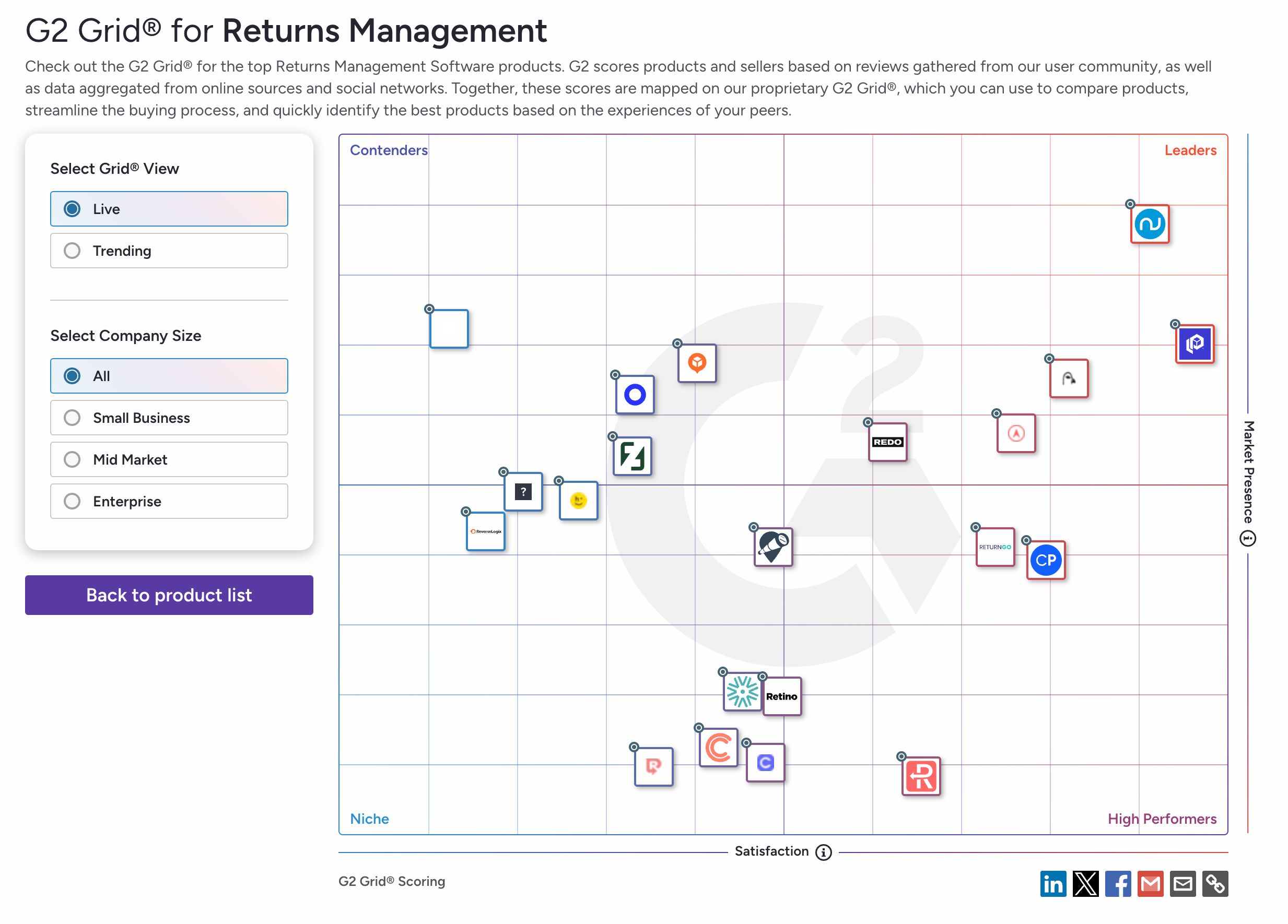
Choosing the right returns software in 2026 can redefine how retailers handle reverse logistics, protect revenue, and deliver a smoother customer experience.
The growing demand for efficient returns processes and the rising costs associated with returned items have made investing in specialized technology a necessity.
Below is a curated list of the 10 most powerful and reliable returns management systems available this year.
| Tools | Best for | Core strength | What it’s known for | Integrations | Pricing | G2 |
| ClickPost | Enterprise post-purchase teams | End-to-end returns automation | Deep reverse-logistics control across 500+ carriers | Carrier APIs, OMS/WMS | Enterprise pricing (custom) | 4.8 |
| AfterShip | SMB → mid-market brands | CX-led returns workflows | Easy setup + strong self-service portals | Shopify, Woo, Magento | Tiered plans | 4.7 |
| ReturnGO | Brands optimizing revenue retention | Exchanges & store credit flows | Intelligent routing + shopper-friendly UX | API, WMS, CRM | From ~$121/mo | 4.8 |
| parcelLab | Enterprise post-purchase teams | Workflow orchestration | Advanced personalization & proactive comms | WMS, OMS | Custom quote | 4.6 |
| Narvar | Mid-to-large enterprises | Analytics & fraud control | AI-driven fraud detection + insights | Ecommerce platforms & carriers | Custom quote | 4.2 |
| Loop Returns | Shopify & DTC brands | Retention-focused returns | Exchange incentives + returnless flows | Shopify ecosystem | Flat / usage-based | 4.7 |
| Happy Returns | Omnichannel retailers | In-person returns | Box-free, label-less Return Bar network | PayPal + ecommerce tools | Volume-based | 4.8 |
| ReverseLogix | Large enterprises & manufacturers | Returns + repairs | Unified platform for RMAs, repairs, recovery | OMS, WMS, TMS | Custom quote | 4.4 |
| ReturnLogic | SMB & mid-market brands | Flexible RMA automation | Balance of control + ease of use | Ecommerce & ops tools | From ~$300/mo | 4.5 |
| Return Rabbit | Shopify-first brands | Portal-led automation | Predictive insights + exchange nudges | Shopify | Free → ~$650/mo | 4.7 |
Editorial Disclosure & Methodology - At ClickPost, we aim to provide the most transparent data in the logistics industry. This 2026 ranking was compiled by our product research team through:
-
Hands-on Testing: Evaluation of dashboard UX and API responsiveness.
-
Technical Review: Analysis of carrier integration depth (300+ carriers) and returns automation logic.
-
Market Data: Analysis of over 1,500 verified user reviews from G2, Capterra, and the Shopify App Store.
While ClickPost is included as a top enterprise solution, our comparisons are based on objective technical benchmarks to help you find the right fit for your specific business size.
1. ClickPost

ClickPost is an AI-powered returns management system that understands your customers’ behavior and personalizes the journey for each cohort. It segments customers based on past return patterns and applies different rules, nudges, and controls depending on their personas.
This system is particularly relevant for brands dealing with repeat returners alongside loyal, high-value customers. ClickPost allows teams to encourage exchanges and offer flexible refund experiences to trusted shoppers, while imposing stricter policy parameters on high-risk return behavior.
On the operations side, ClickPost is built for scale. It is commonly used by high-volume retailers managing multiple carriers, warehouses, or fulfillment models. The platform centralizes reverse logistics decisions across these setups. It handles return labels, pickup scheduling with over 500 integrated carrier partners, carrier allocation based on custom logic, and real-time status tracking.
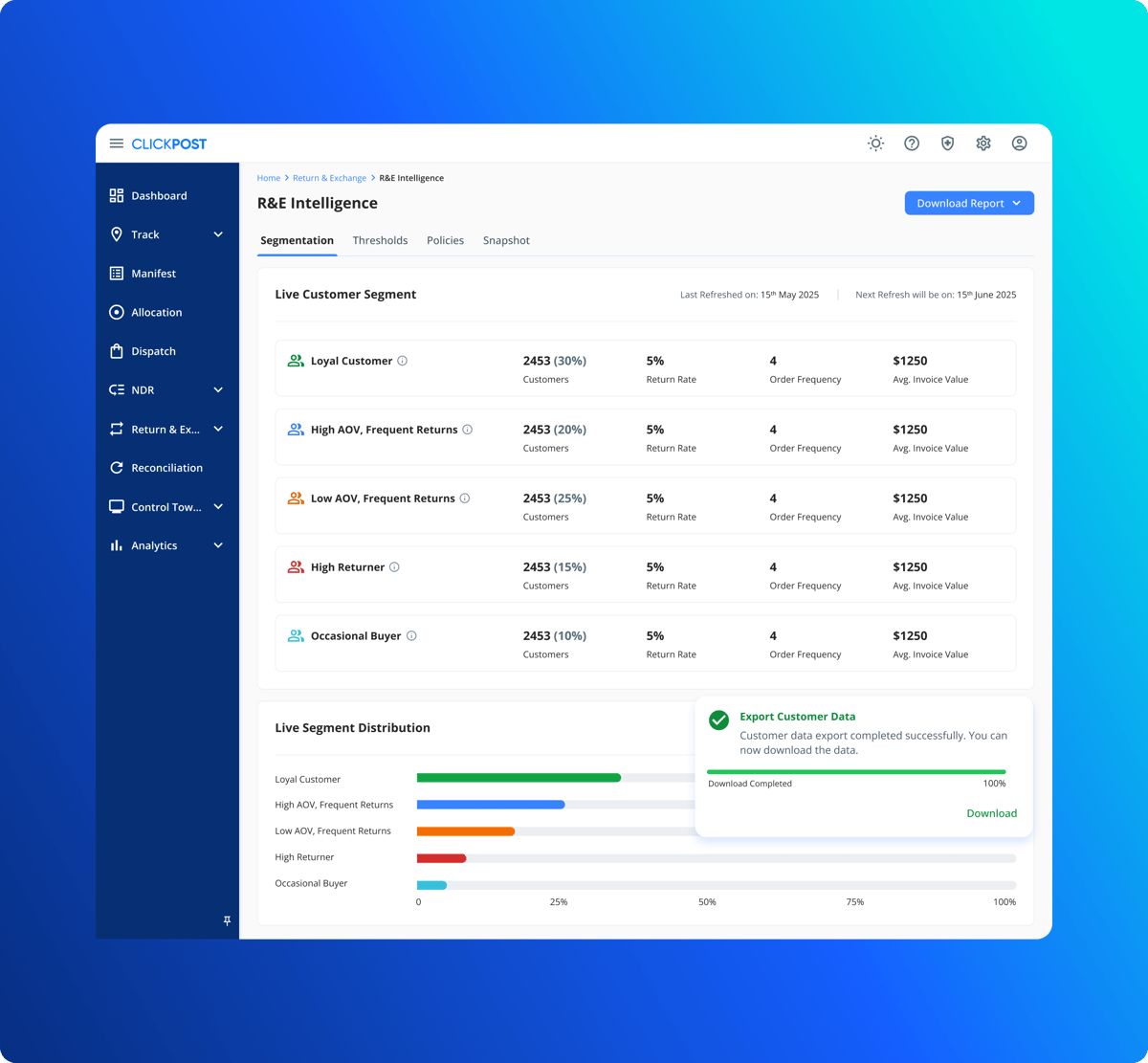
Key Features:
-
Branded, fully customizable returns portal aligned with your return policies.
-
Smart nudges for exchanges, full catalog exchange, and instant price reconciliation
-
AI-enabled customer segmentation and personalized tracking pages.
-
Real-time updates via APIs and webhooks, plus multi-channel notifications
-
Store credit incentives and automated refunds at set milestones.
G2 Rating: 4.8/5
ClickPost pricing depends on shipment volume and selected product modules, aligning costs with actual usage across tracking and returns.
The experience on the Returns & Exchange module has been really good, every process is completely transparent. The UI is very agent friendly and can be used by non tech people, hence making it scalable. All customization requests have been scoped out and assessed end-to-end, keeping both the brand and the technology in mind. Looking forward to new ideas and solutions in the RVP journey as a whole.”
From Nakshatra Jain, Associate Product Manager at Curefit.
2. AfterShip Returns
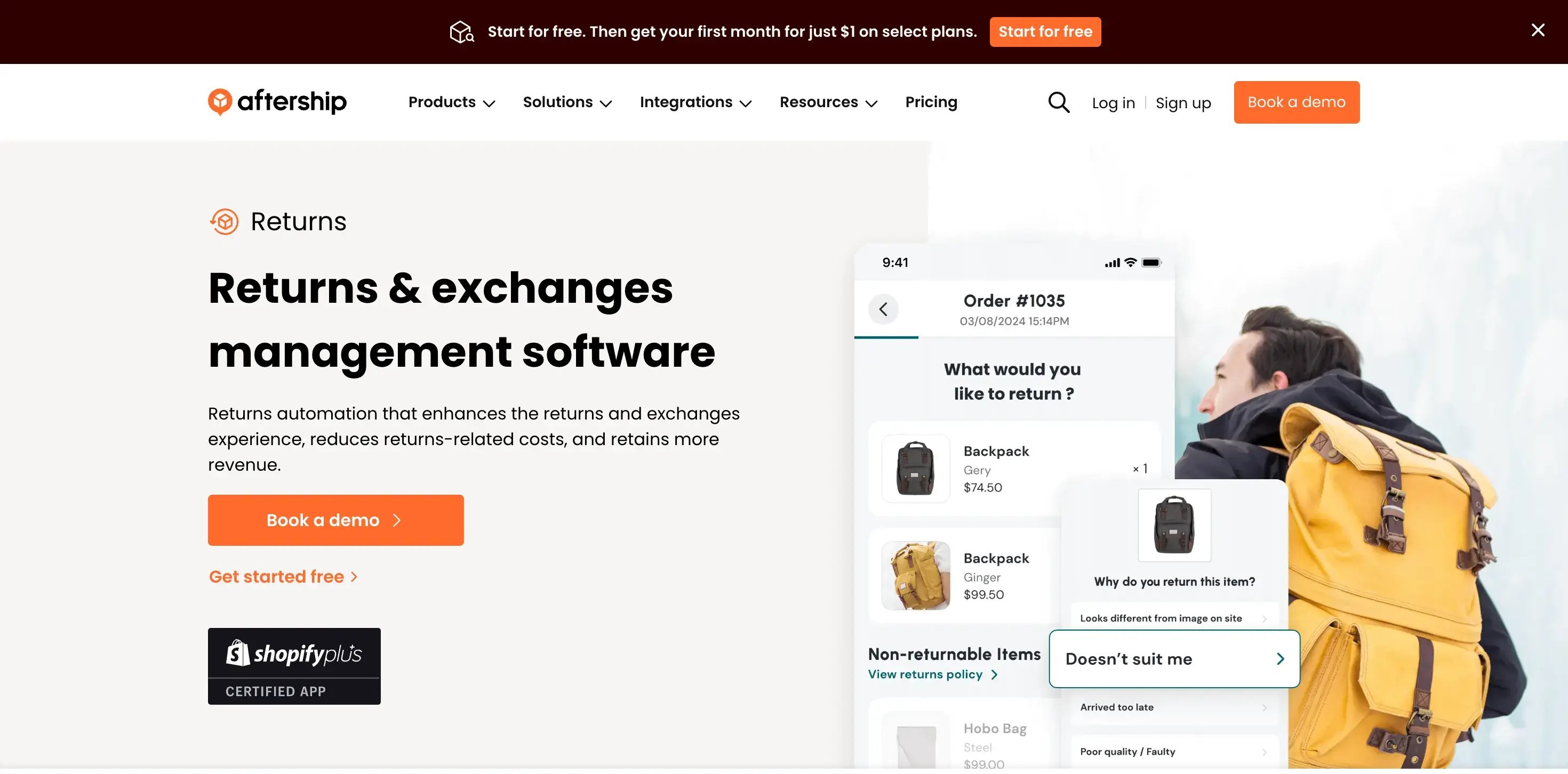
AfterShip Returns focuses on simplifying returns administration through clear policies and predictable automation. It accelerates return approvals and makes it easy for teams to locate individual returns using filters and tags. It is built for e-commerce teams that want branded tracking pages, partial refunds, and status-based return notifications, without adding extra operational layers to their return setup.
Key features:
-
Self-service return portals for customer-initiated requests.
-
Configurable return policies with exclusions and conditions.
-
Dashboard for return reasons and high-level analytics.
-
Return label generation and reverse shipment tracking.
-
Exchanges and store-credit resolutions.
AfterShip pricing is tiered across Essentials, Pro, and Premium plans, typically aligned with low-volume users, growing businesses, and large retailers, respectively. It also offers custom enterprise plans for teams that require deeper integrations or advanced analytics.
G2 Rating: 4.7/5
3. ReturnGO
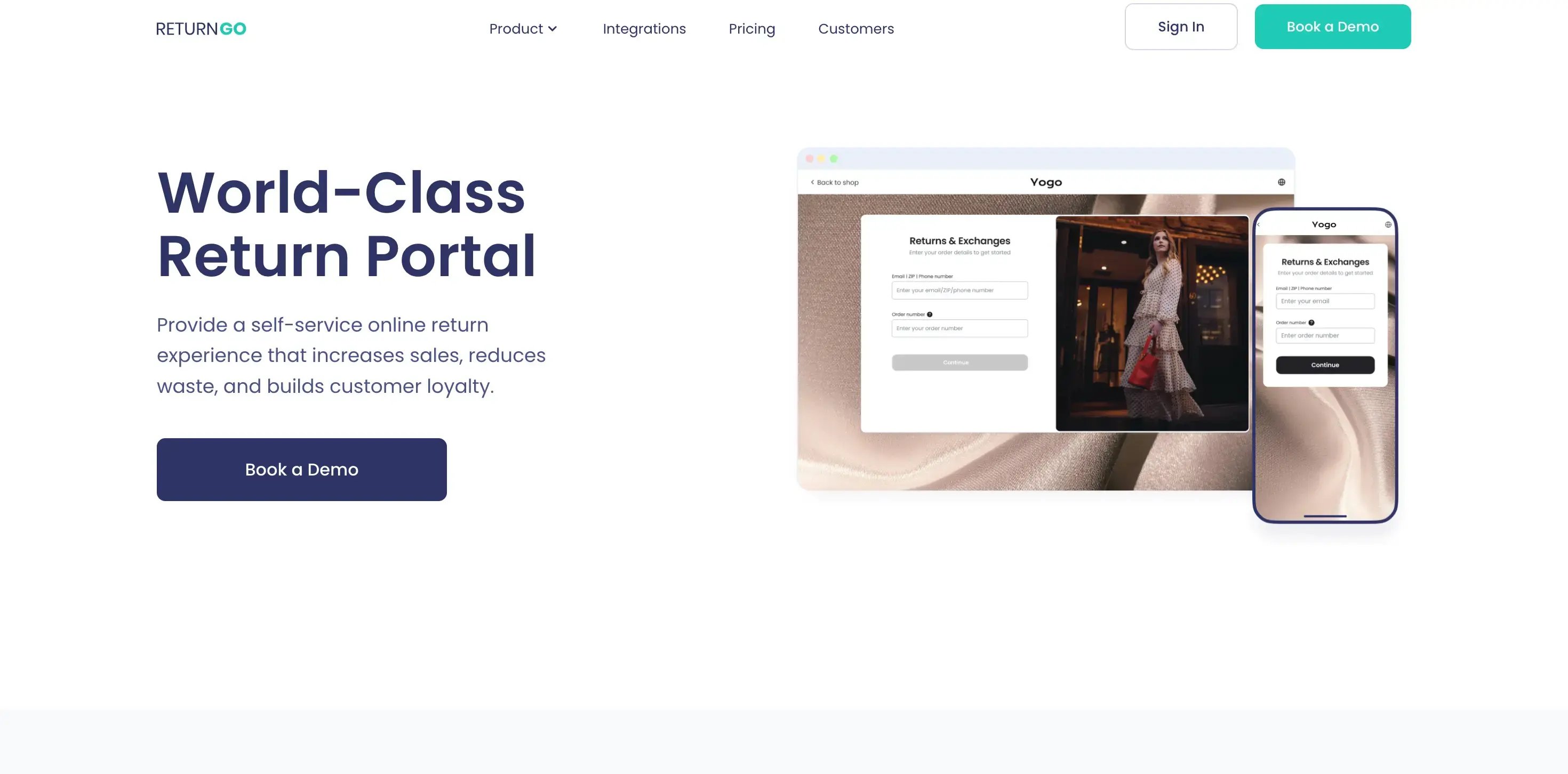
ReturnGO delivers a self-serve returns experience for both merchants and customers. Its returns portal is embedded directly into the storefront, making it easier for customers to request returns—particularly useful for scaling DTC brands. With a focus on instant exchanges, store credit conversions, and in-portal swaps, the platform is designed to help brands recover revenue rather than default to refunds.
Key features:
-
Custom return reasons, window lengths, and SKU-level policies.
-
Multiple resolution options, like store credit and returnless refund flows
-
Prepaid label generation and warehouse location routing.
-
Branded email and SMS notifications.
-
Extended return windows managed through configurable policies
ReturnGO offers tiered pricing, starting with plans that cover core returns functionality and extending to higher tiers for advanced automation and ERP integrations. Custom plans are available for retailers operating multiple stores or an omnichannel setup.
G2 Rating: 4.8/5
4. parcelLab
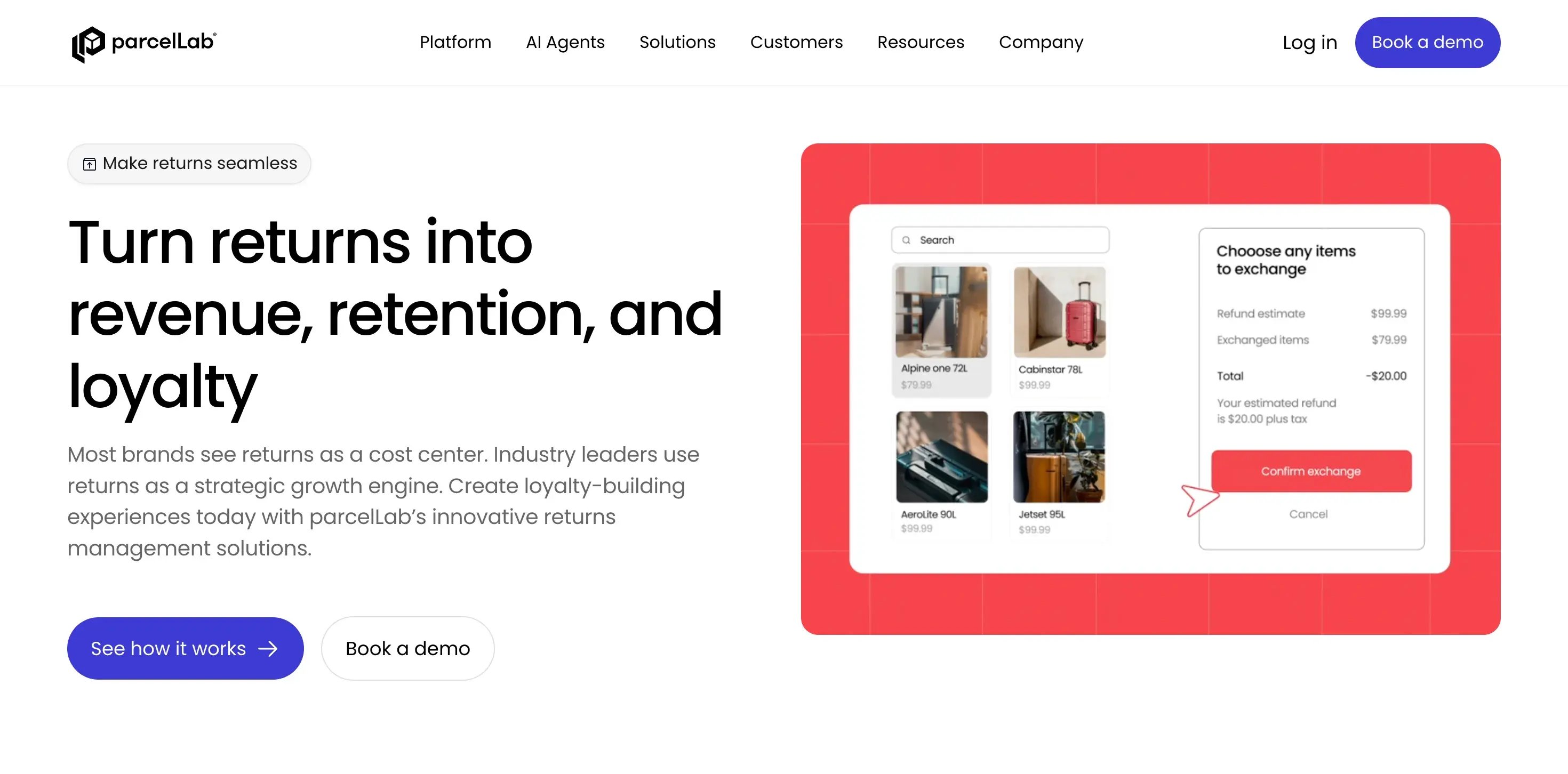
parcelLab positions returns as part of an AI-led post-purchase experience, with a strong emphasis on personalization and automated returns. The platform uses AI to tailor return communications, apply approval logic, analyze return trends, and provide product insights. parcelLab is integrated with Zendesk and Salesforce, enabling support teams to quickly access tracking data and resolve return-related queries.
Key features:
-
Policy configuration with product-level eligibility rules.
-
Warehouse integrations for refund processing and inventory updates.
-
Hidden return-pattern detections and fraud analytics.
-
Smart warehouse routing and split returns management.
-
Multiple return options, including in-store drop-offs.
5. Narvar Returns
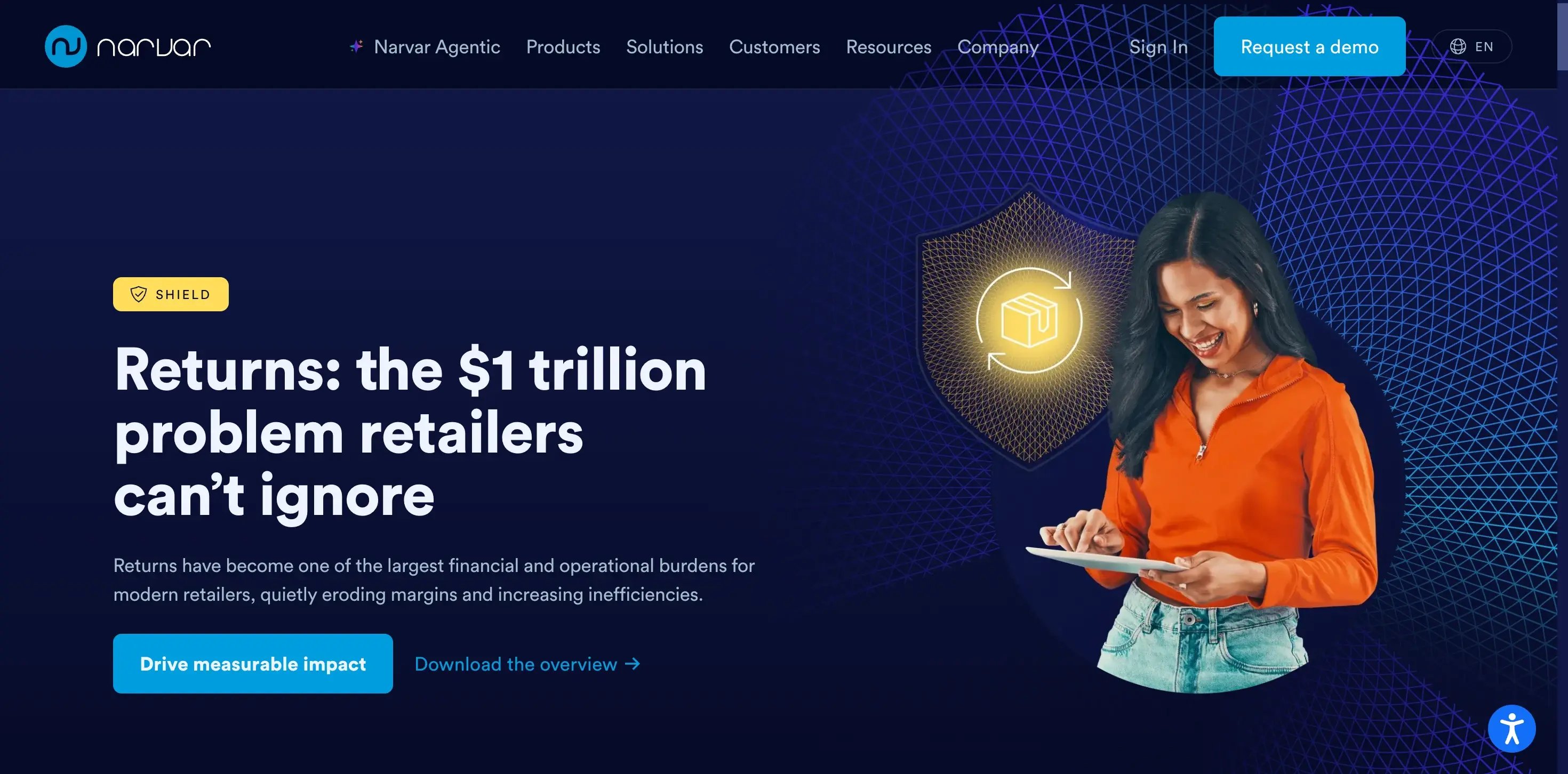
Narvar’s returns platform is designed to support enterprise retailers that need tighter control over return fraud and customer experience at scale. Its proprietary AI detects fraud and implements eligibility rules in real time. Through its Return Concierge offering, Narvar provides access to a large network of carrier and partner drop-off locations, helping brands consolidate returns and reduce reverse-logistics costs.
Key features:
-
Customizable tracking and returns pages.
-
AI-based eligibility rules and fraud flagging
-
Exchange and store-credit nudges during returns
-
Dynamic routing and discounts on shipping rates.
-
Analytics to monitor fraud patterns and revenue retention
Narvar does not publish standard pricing and operates on a custom pricing model, with costs typically determined by return volume, enabled features, and configuration requirements.
G2 Rating: 4.2/5
6. Loop Returns
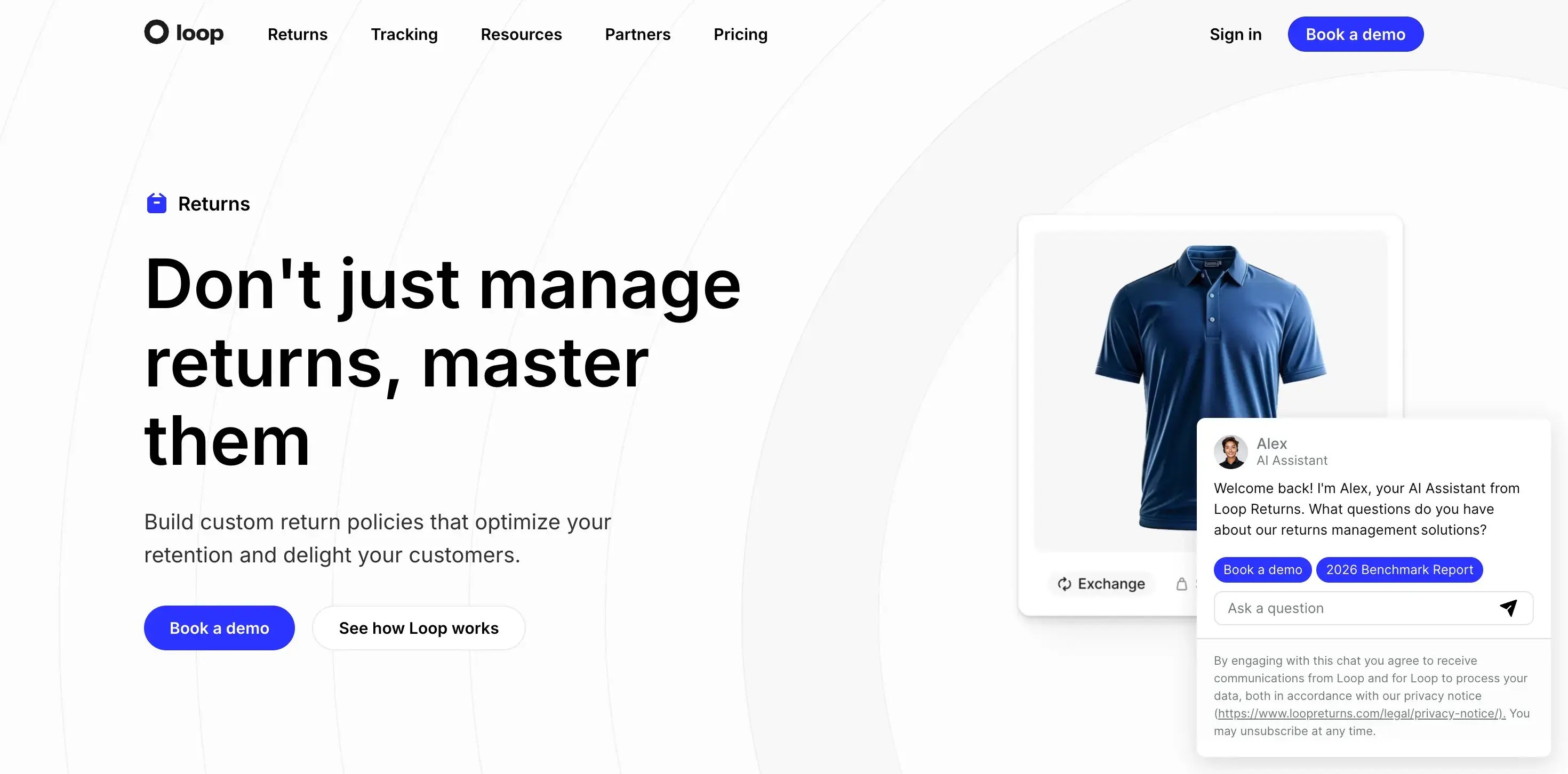
Loop Returns is an exchange-first returns platform built primarily for Shopify-based DTC brands. It simplifies exchanges by allowing customers to swap sizes, colors, or products and receive replacements quickly. Loop is best known for its Shop Now feature, which encourages shoppers to choose a new item instead of taking a refund, helping brands improve exchange rates and retain revenue.
Key features:
-
Policy customization for return fees, free shipping, and bonus credits
-
Exchange-first workflows and returnless refund options.
-
Product suggestions surfaced within exchange flows.
-
Native integration with Shopify and a large Shopify app ecosystem.
-
In-person returns through Loop’s Return Bar network.
Loop Returns does not publicly disclose pricing and follows a custom pricing approach.
G2 Rating: 4.7/5
7. Happy Returns
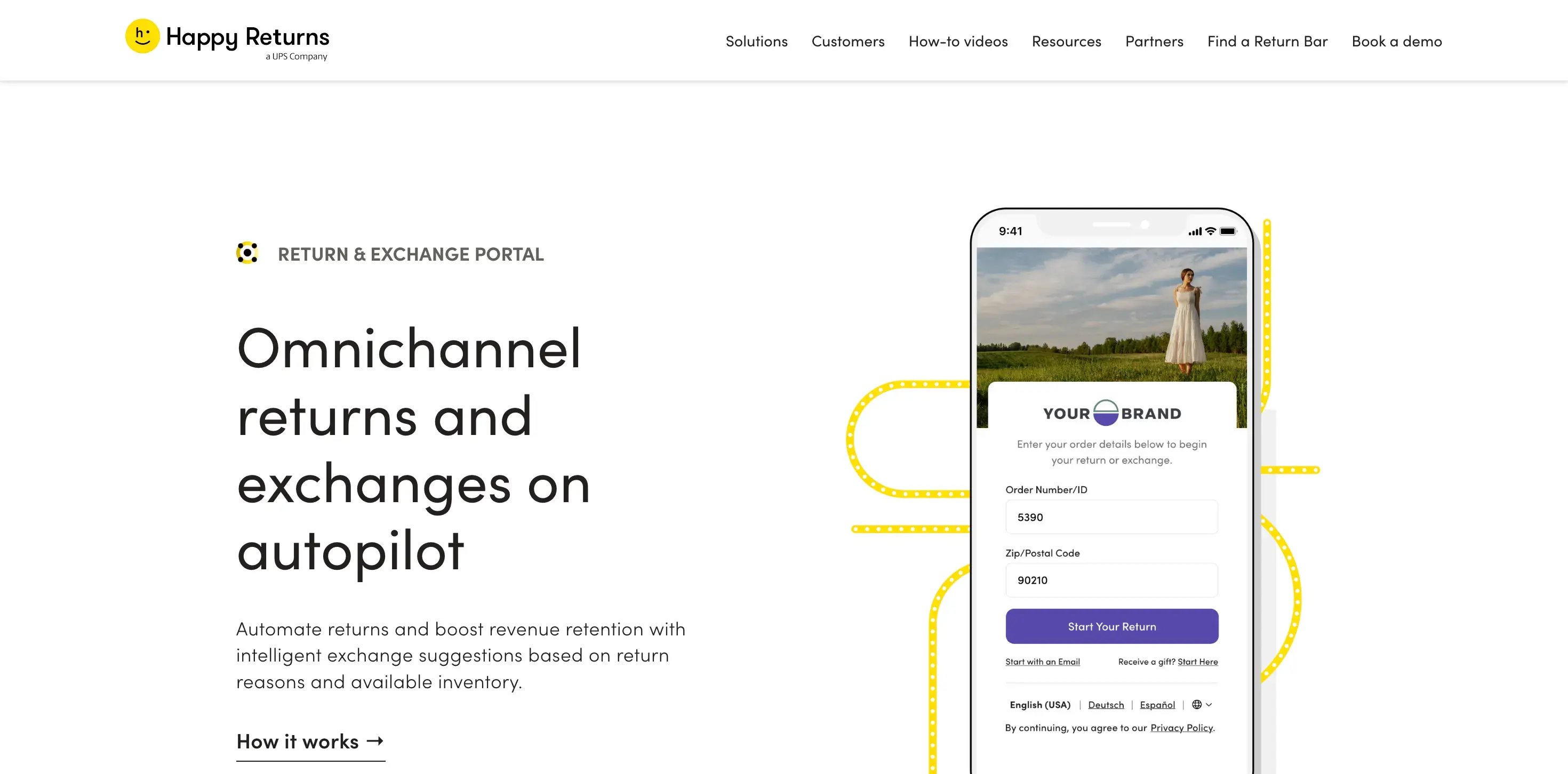
Happy Returns, now part of UPS, stands out for making in-person returns convenient. With over 8,000 Return Bar locations in the US, it offers instant refunds at drop-off and supports box-free, label-free returns. For retailers, the platform focuses on consolidating returns and handling bulk shipping. This helps reduce transportation costs and speed up restocking, while allowing basic item verification at drop-off.
Key features:
-
One-click exchanges and incentives for store credit.
-
White-labelled portal for initiating online returns.
-
Consolidated reverse logistics and bulk return aggregation.
-
Support for cross-brand returns and exchanges.
-
Audit products at drop-off to prevent fraud.
Pricing varies based on volume and configuration and is typically offered through custom agreements.
8. ReverseLogix
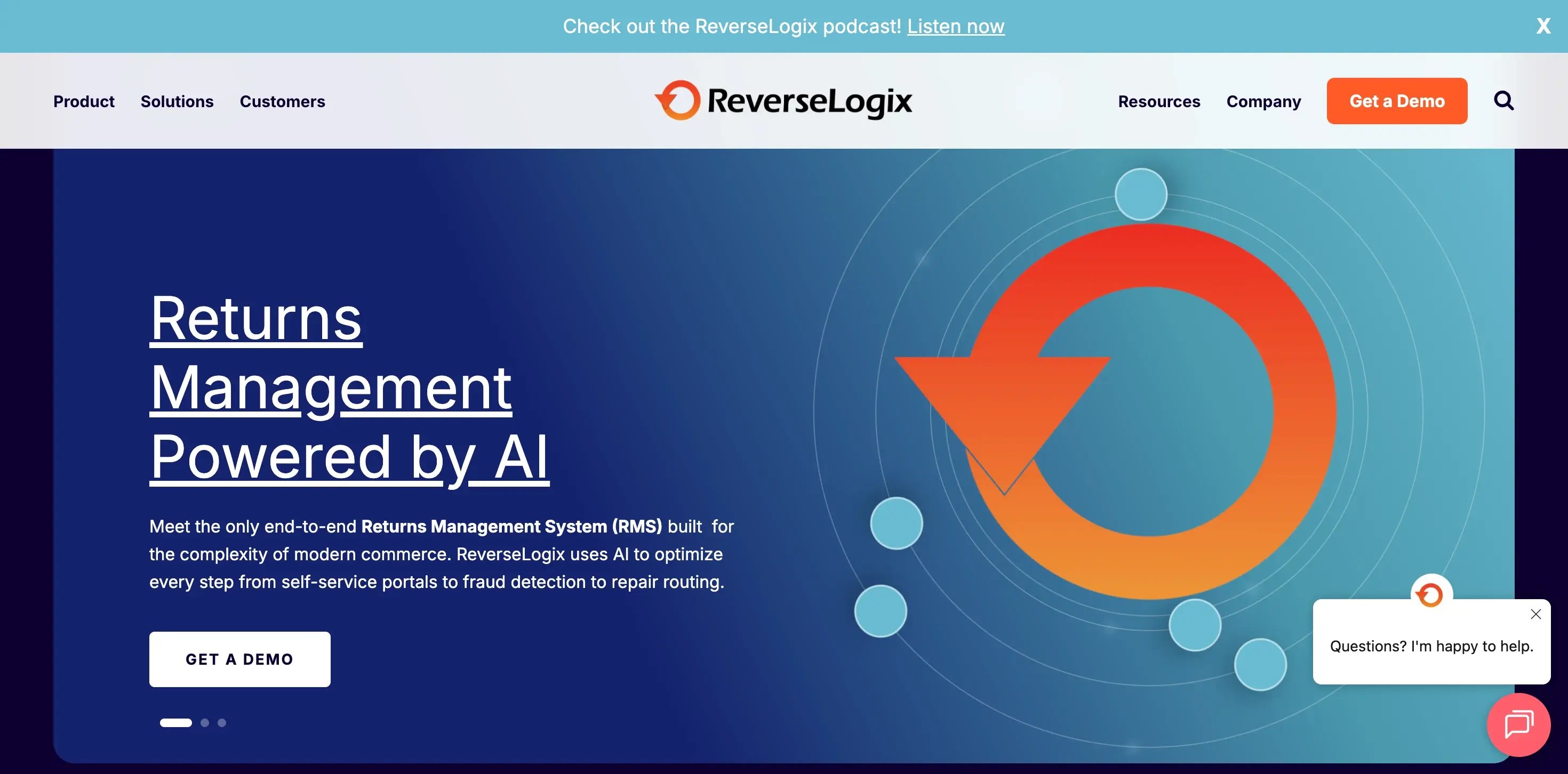
ReverseLogix is an enterprise-grade returns management platform built for retailers and manufacturers with complex reverse-logistics needs. It’s speciality is supporting repairs, warranties, and asset recovery within a single system. The platform is designed for large-scale operations with detailed operational visibility across returns, replacements, and restocking workflows.
Key features:
-
End-to-end returns management from return approval to restocking.
-
Support for reverse logistics, warranty repairs, and replacements.
-
Advanced analytics focused on cost control.
-
Integrations with warehouse, OMS, and transportation systems.
-
Centralized dashboards for cross-team coordination.
ReverseLogix currently does not offer a pricing page. It has a custom pricing policy based on order volume and integrations.
G2 Rating: 4.4/5
9. ReturnLogic
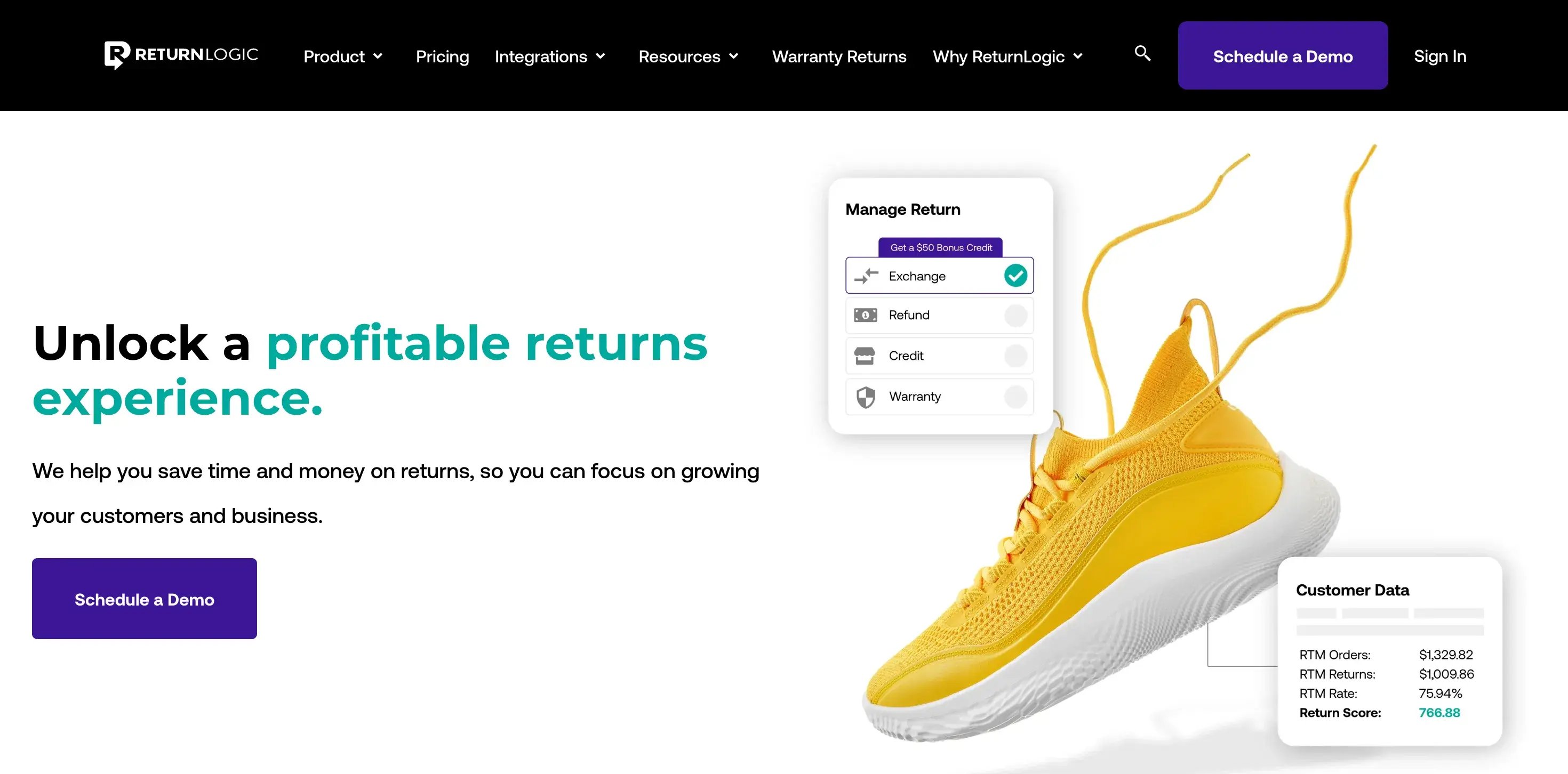
ReturnLogic is aimed at small and mid-sized e-commerce brands that want to offer a convenient returns experience for customers. It prioritizes standardizing RMAs and refunds through a branded self-service portal and return routing via configurable rules. The platform is best suited for Shopify and BigCommerce stores that need visibility into return behavior and revenue recovery tools, including return protection fees.
Key features:
-
Branded self-serve portal for customer returns
-
Automated RMA creation and refund/exchange workflows
-
Analytics for return reasons, trends, and operational insights
-
Policy configuration with incentives like bonus credits and exchanges
-
Unified tracking of returns, exchanges, and warranty claims
ReturnLogic uses a volume-based pricing model, with entry plans for smaller RMA volumes and higher tiers for greater automation.
G2 Rating: 4.5/5
10. Return Rabbit (formerly AspenCX)
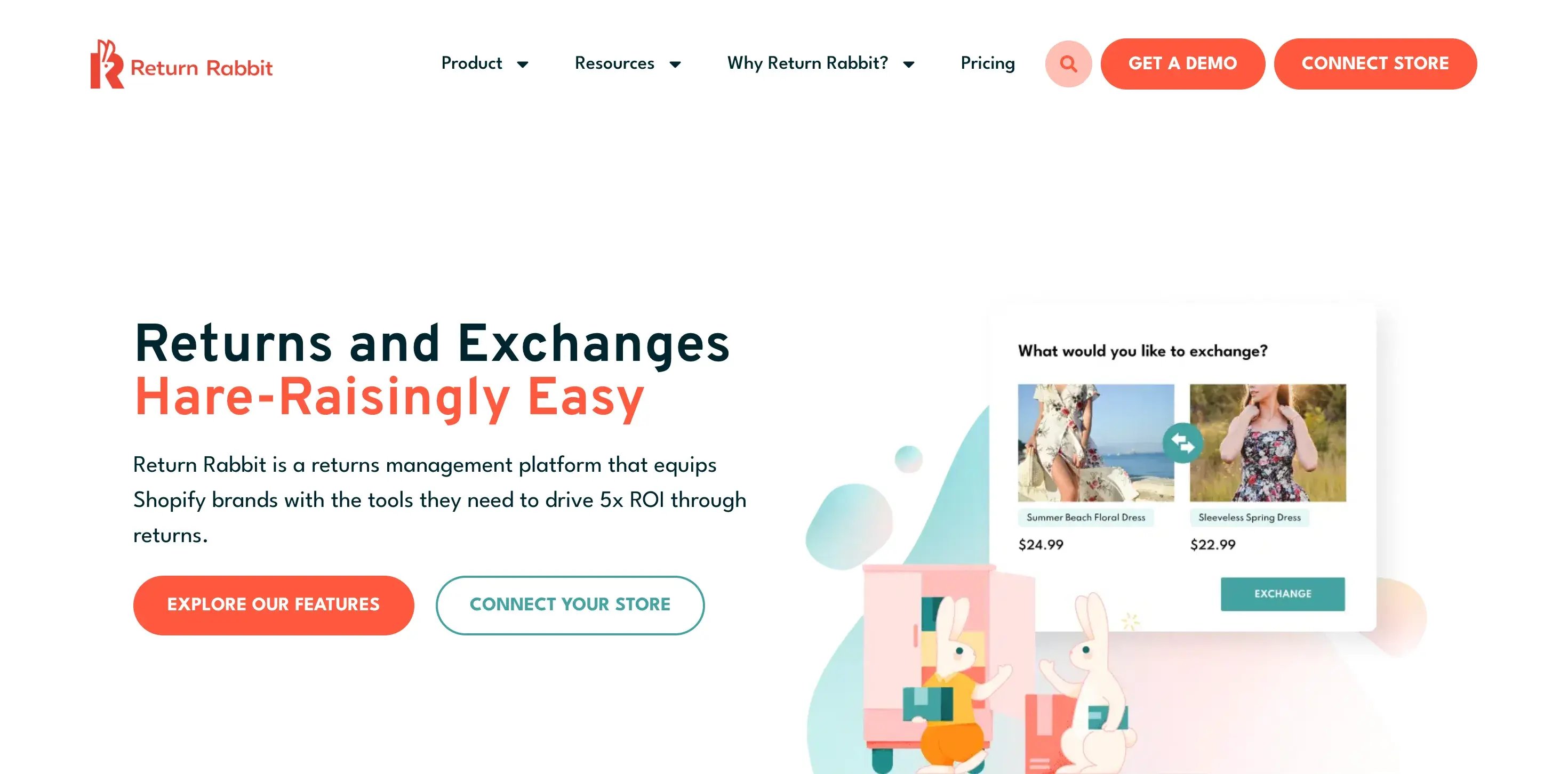
Return Rabbit is a Shopify-centric returns and exchange platform that converts returns into exchanges with the help of incentives. It combines brandable, self-serve return portals with automated RMA routing, pre-paid labels, and multiple notification statuses. Its native recommendation engine uses shopper history to suggest relevant products during exchanges, ultimately improving the customer experience.
Key features:
-
Branded self-serve portal and configurable return policies.
-
Automated label creation and return tracking.
-
Exchange incentives and product recommendation engine.
-
ROI-oriented analytics and reporting.
-
Printerless QR code returns and real-time updates.
Benefits of AI-powered returns management solutions for e-commerce business
AI in returns management is now a standard, as many software companies are developing AI-powered products to handle scaling volumes, deter policy abuse, and personalize the experience for each customer.

1. Improved efficiency and automation
AI helps classify return requests as they come in, using multiple filters such as item types, order value, customer history, and policy rules. This removes manual triage from support teams and shortens approval cycles, especially during peak periods such as the Holiday season, when return volumes spike.
2. Reduced operational costs
AI routes returned items to the most cost-effective warehouse, especially in cases of multi-warehouse integrations. This ensures restocking is closer to demand, shipments are consolidated, and returned items are segregated for refurbishment or disposal.
3. Real-time return tracking and visibility
An AI-powered returns management software consolidates carrier updates, warehouse scans, and refund milestones into a single dashboard. Customer support teams can spot delays in refunds while customers receive on-time status updates. AI-driven notifications are also becoming popular, with hyper-personalized content based on customer personas.
4. Automated refunds and exchanges
AI applies return rules tailored to every user. It determines whether a return qualifies for a refund, store credit, exchange, or manual review. This reduces refund disputes, prevents policy abuse, and protects margins without slowing down the process.
5. Enhanced fraud detection
AI surfaces fraud patterns early on. It can detect abuse signals such as excessive return requests, repeated “item not as described” or “missing items” claims, or mismatched product allegations. Coupled with image verification and a history of returns, AI can identify policy abuse and help brands implement stringent measures before financial damage becomes systemic.
6. Better inventory management
AI-driven insights improve inventory and warehouse management for returned items by optimizing how returned products are handled: restock, refurbish, resell, or liquidate. It reduces write-offs and shortens the time items sit idle in warehouses.
7. Smarter decision-making with predictive analytics
AI highlights trends that matter operationally: SKUs with abnormal return rates, size-related issues, carrier bottlenecks, or policy loopholes. These insights feed back into merchandising, logistics, and CX decisions.
8. Enhanced customer experience
AI ensures faster resolution times, levels up exchange convenience, and improves refund tracking. Some returns management software uses AI to recommend products personalized to customer preferences or to use AI chatbots to help resolve return-related queries. Overall, it boosts customer satisfaction and enhances brand credibility.
Why E-commerce Returns Have Become an Operational Problem?
Return volume has increased steadily over the year. In the US, $849.9 billion worth of annual sales were returned last year. It is no longer a simple customer experience challenge, but a challenge that directly impacts margins, support costs, and inventory planning.
Some of the most common issues brands face include:
High operational overhead: Manual approvals, pickup coordination, quality inspection, and restocking consume significant time for operations teams.
Fragmented visibility: Return data when scattered across emails, carrier portals, and spreadsheets becomes a struggle of a series of delayed decisions.
Revenue leakage: Without effective exchange and store credit nudges, customers' requests for refunds increase, leading to margin erosion.
Support ticket overload: Lack of real-time refund/exchange updates drives customers to contact support for basic information, overwhelming support resources.
Returns management tool addresses these problems by standardizing how returns are initiated, processed, tracked, and resolved.
Returns management software offers solutions to these operational issues, addressing the lack of automated systems and the strain on the ops team.
7 Key Features to Look for in Returns Management Platforms
A reliable RMS must do more than automate refunds. At scale, returns software needs to handle exceptions, enforce policies consistently, and enable feature customization to suit a brand’s unique return situation.
1. Automated returns processing
Automation should handle standard return cases without manual reviews. This includes issuing RMAs, validating eligibility, enabling exchanges, and routing items correctly.
Key benefits:
-
Scales as return volumes increase
-
Applies return policies consistently without manual checks
2. Customizable return policies
Returns policies can vary by product type, order value, and customer segment. You should be able to customize return windows, offer different refund resolutions, and allow limitations or return fees to be set.
Key benefits:
-
Adapts policies to different customer segments
-
Allows differentiated handling for high-value, high-risk orders.
-
Improves policy enforcement during sales or promotions.
3. Real-time tracking and visibility
Returns create operational risk when teams cannot see where items are or who is responsible for the next action. RMS platforms. It should support real-time shipment tracking, generate uniform return statuses, and surface exceptions early.
Key benefits:
-
Builds trust with customers.
-
Proactively identifies delays or exceptions.
-
Increases transparency across teams.
4. Automated refund & exchange processing
Customers now expect immediate confirmation of refunds and exchanges. RMS platforms must automatically validate eligibility, issue refunds, or offer exchange credits.
Key benefits:
-
Reduces wait time and manual checks.
-
Improves post-purchase satisfaction.
-
Boosts retention by offering easy exchanges.
5. Integration with eCommerce platforms
Returns software should integrate natively with commerce platforms and operational systems to avoid data latency. Orders, inventory, and return status must stay in sync across tools.
Key benefits:
-
Enables real-time data syncing.
-
Streamlines operational workflows.
-
Prevents duplicated work and reconciliation issues
6. Customizable return labels and instructions
Your returns process should reflect your brand. RMS tools must offer templates for return labels, emails, and portal instructions that can be tailored for different product categories or customer tiers.
Key benefits:
-
Reduces misrouted or non-compliant returns
-
Reinforces brand experience.
7. Reporting and analytics
From SKU-level return rates to geographic patterns and carrier performance, modern RMS tools must offer intuitive dashboards that reveal what is driving returns and what actions are needed.
Key benefits:
-
Enables cost and fraud analysis.
-
Identifies product and service issues.
-
Supports better forecasting and planning.
Streamline returns with our powerful returns platform – Try it today!
ClickPost offers everything a modern retailer needs from a returns system: scalability, data-driven decisions, and seamless integrations with carriers, WMS, and storefronts.
With a branded portal, AI-driven fraud prevention, and 500+ carrier integrations, ClickPost becomes the backbone for reverse logistics success.
Ready to take control of your ecommerce returns?
Try ClickPost and transform your returns from a cost centre to a customer loyalty engine. Get in touch for a custom demo and discover how we can build your brand’s ideal returns ecosystem.
Rethinking returns: A new perspective on growth
Returns often reflect unmet customer expectations, product misalignments, or operational inefficiencies. E-commerce retailers in 2026 are realizing that returns present an opportunity: to win back customer trust, optimize their operations, and strengthen revenue streams.
Investing in a returns management system is thus a strategic decision. Having the right returns management software converts a refund into a revenue reroute. As retail evolves, the boundaries between purchase and post-purchase must blur into one consistent customer experience. Fraud prevention and AI-assisted customer engagement are two cornerstones of modern retail operations.
So, what defines the winners in this space? It’s agility brought by systems like ClickPost, Narvar, and parcelLab. Brands that embrace a holistic, data-informed approach to reverse logistics not only reduce costs but also gain actionable insights to redefine their entire supply chain. And in doing so, they transform every churn moment into a retention milestone.
Frequently Asked Questions (FAQs)
1. What is the best returns management (RMS) software in 2026 for ecommerce brands?
The best returns management software is one that balances customer convenience with operational control. Platforms like ClickPost, Narvar, Loop Returns, and AfterShip help brands automate approvals, favor exchanges over refunds, integrate with carriers, and understand where returns impact revenue.
2. What features should a modern returns management platform have?
A modern returns management platform should allow customers to self-serve returns while automating the decisions behind the scenes. It should support policy-based eligibility checks, multiple exchange and store credit options, carrier-linked return labels, and real-time status updates. Additionally, it should detect fraud signals.
3. Which returns management tools help minimize manual intervention in the returns process?
Returns management tools that minimize manual intervention use policy logic to handle standard cases automatically, while escalating exceptions, such as a refund for a high-value item. Platforms like ClickPost, Loop Returns, and Narvar automate eligibility checks, enable store credits, and flag high-value, high-risk, or non-compliant returns for review. This reduces repetitive support work but keeps necessary fraud controls in place.
4. How can returns management software reduce refunds and increase exchanges instead?
Returns management software reduces refunds by guiding customers toward alternatives before a refund becomes the default. Exchange and replacement options are presented during the return process. Price differences and approvals are handled automatically. This helps brands retain revenue and enable higher-value exchanges.
5. How does returns automation software help prevent fraudulent returns?
Returns automation helps control fraud through pattern-based analysis across return behavior. Frequent returns, high-value items, inconsistent reasons, or unusual timing trigger stricter rules or a manual review. This protects margins without slowing down legitimate customers.
6. Can returns management systems automate product quality checks using images?
Yes. Some returns management systems, including ClickPost, support image or video uploads during the return request. These visuals help teams assess visible damage, missing parts, or condition issues before approving refunds or exchanges. This reduces back-and-forth, speeds up decisions, and prevents unsuitable items from re-entering inventory.
7. What analytics and reporting should a returns management system provide?
Effective returns reporting connects return behavior to decisions. Teams should see which products and policies drive repeat returns, how exchanges perform against refunds, and where operational delays occur, to fix the root causes of product returns.
8. Can a returns management system integrate with Shopify and other ecommerce platforms?
Yes. Leading returns platforms integrate with Shopify and other ecommerce systems to sync orders, items, and fulfillment data. This reduces manual work, prevents data mismatches, and keeps returns aligned with the original order flow.
9. What should brands look for in a returns management platform to minimize operational costs?
Brands should look for cost-efficient returns platforms that remove manual steps from return/exchange processing, streamline routing and carrier allocation, and reduce WISMR (Where Is My Refund) inquiries through real-time customer communication. These lead to fewer support tickets and exchange conversions, which reduce both labor and logistics costs over time.
10. How can returns management software improve customer satisfaction in the post-purchase experience?
Returns management software improves customer satisfaction by removing uncertainty from the return process. Customers can initiate returns on their own, see clear next steps, track progress, and receive timely resolutions. When outcomes are predictable and communication is consistent, customers can set realistic expectations.
✔️ Technical Review by - Kammaljit Deka - Product Manager at ClickPost (Last Fact-Checked: 6th February 2026)


.png?width=879&height=549&name=Page%2074%20(1).png)